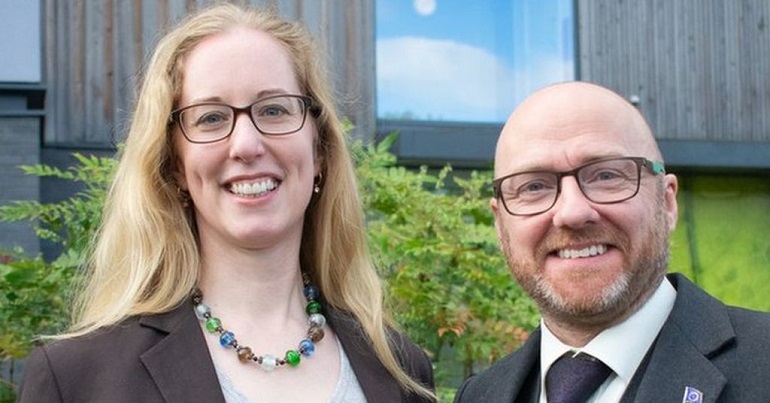On the future of food in Scotland – an interview with Pete Ritchie (part 2)
Part 1 appeared yesterday, you can read it here
And thus politics comes into full focus. There is a lot that can be said about the SNP’s recent landslide in the Scottish elections, but for Pete their attitude to food is worth mentioning: “Of all the parties they are by far the strongest on both rural issues and food. They ‘get’ food.” Such an attitude is crucial because, in Scotland, food is big business. According to one study undertaken in 2009, food and drink comprised about a seventh, or £.3.6 billion of the £21.1 billion made in exports, a total which excludes oil and gas.1 Part of creating a more viable Scottish economy will involve developing this and to a certain extent this is already happening, with Scottish Development International reporting that Scottish food and drink exports reached an all-time high of £4.06 billion in recent years. By 2017, the government hopes to grow these exports to £5.1 billion.2
On the question of local, small-scale agriculture, however, the picture gets a bit more complicated. While the government has paid a lot of attention to larger companies, developing the local food economy is more complex, even if there is, in principle, the desire to do so. As Pete argues, “There isn’t one lever you can pull to support local food.”
Traditionally, government’s play a crucial role in guiding food production, but this can have both good and bad results. As is painstakingly demonstrated in books like ‘The End of Food’ by Paul Roberts, U.S. government policy has contributed to the nation’s glut of cheap corn, supporting unsustainable farming methods and an endless stream of junk and fast food. The UK government has also been somewhat unhelpful, in its direct and indirect support for massive retailers like Tesco, as Andrew Simm’s Tescopoloy makes clear. Some farmers interested in more ecological and local practices, like Joel Salatin (who you might remember if you’ve seen the film version of Food, Inc) see emerging practices served best by less government interference rather than more.
Can the government action go in the other direction? Pete sees another two reforms as being important. The first involves a greater mutualisation of the food system. When I asked what he meant by this, I got the following reply:
“It’s based around the notion that smaller producers and consumer have a lot in common – common interests in getting affordable local foods – but there is no way of united those common interests at the moment. Food is therefore spot-purchase at farmers markets and shops, meaning little investment for smaller producers to invest or scale up their operations or improve distribution. Smaller producers also are more vulnerable to hazards than big producers, so you have a market failure in local food. I’m in favour of creating organizations that cross the divide by getting credit unions to buy local food from local producers. There are examples of this being done all over the world, the biggest of which is the fair trade movement where there is a constructive relationship between the consumers and the producers, mediated by a third party, in order to get a commonly regarded fair price.”
Here, there is some promise of future reform. As Pete notes: “The Scottish government is even proposing to develop this infrastructure, although this isn’t easy because of the disparate nature of the production, but it can be done.” He goes on to stress the title of the most recent publication on food from the government, entitled “Our Mutual Food”. From my own experience, I think it’s worth noting the current government initiative to recruit someone to co-ordinate more effective use of derelict space as allotments.
What is clearly needed here is the consumer pressure to ease this along. While there are examples of this happening, such as at Edinburgh University where students purchase and distribute locally produced organic food, there is endless potential for expansion through credit unions, tenants associations and social clubs. The notion of linking together urban consumers with their rural counterparts is compelling, and something that could easily benefit from government support in the form of subsidy, provided that there is the political will to do it.
His second idea is more concerned with what he calls ‘ecosystem services’, i.e. the naturally accruing benefits that the land provides. Here, he suggests that possibility that the ‘value’ of land might be determined, in terms of it’s potential productivity, location and vegetation, and then land use which does not realize these benefits could be taxed on this basis. While this goes against the grain of individualistic property owning norms, it’s possible that in an age of harshly divided ownership and increasingly egregious environmental problems, such an idea might catch on. It’s also supported by a basic moral claim that Pete articulate well: “The idea that you can simply hang on to land without a particularly productive or creative use for it, seems deeply wrong.”
Alongside this, he suggests that ecosystem services which generate electricity might be nationalized, thus creating a collective gain that might otherwise simply accrue to landowners:
“The nationalization of ecosystem services is a linked idea – saying that the wind that flows over the land, the water that flows through and the sun that shines on it isn’t yours. You can own the land but you don’t own what nature provides. So the electricity that is produced through hydroelectric or solar or wind would be held in common instead of attributable to individuals. It wouldn’t be popular with landowners but would be a fairer way to distribute the fruits of the renewables bonanza that is about to hit Scotland.”
We could certainly use the money, but it’s worth bearing in mind the potential challenge that landowners might pose to such a radical move. Whether the SNP are prepared to take them on is not entirely clear. Despite the relative torrent of land reform that characterized the first 2 Scottish Parliaments (involving 7 pieces of legislation including the end of feudal tenure and the creation of the right to responsible access) the first SNP led Parliament was reasonably tame by comparison. While it is possible that the new, absolute majority that they have obtained will change this, doubtlessly it will be a question of political agitation on the part of the Scottish population to secure such changes.
Joseph Ritchie blogs at A Scanner Despairingly.



I’m tempted to reply that Alex Salmond certainly “gets food” but that would be unworthy. Pete is a great ambassador for the local food movement and in the early days of the Shandon Local Food Group, that I helped to set up, Pete was an inspiring helper. The thing that now obsesses me about the local food movement, though, is scale. Even the biggest and best of the programmes in recent years will not keep Mr Tesco or Dr Asda awake at night. What we need from the SG is a fiscal and regultatory environment that starts to redress the balance. The small farming businesses and farmers’ markets and community food movement will do the rest. Until then I’ll suspect than the SNP support “Big Food” just as much as in their kow-towing to Donald Trump they supported Big Golf.
The SNP certainly ‘get’ food, when the Chinese proposed a Norwegian salmon boycott because the Nobel prize was awarded to Liu Xiaobo last year, Eck jumped in promising to double Scottish farmed salmon production a move that would worsen an already dire ecological crisis on our West Coast. I don’t see a fundamental shift in Sco Gov’s approach since Ross Finnie’s days. We’ll wait and see whether significant land reform measures can win through over Eck’s Scotland plc approach.